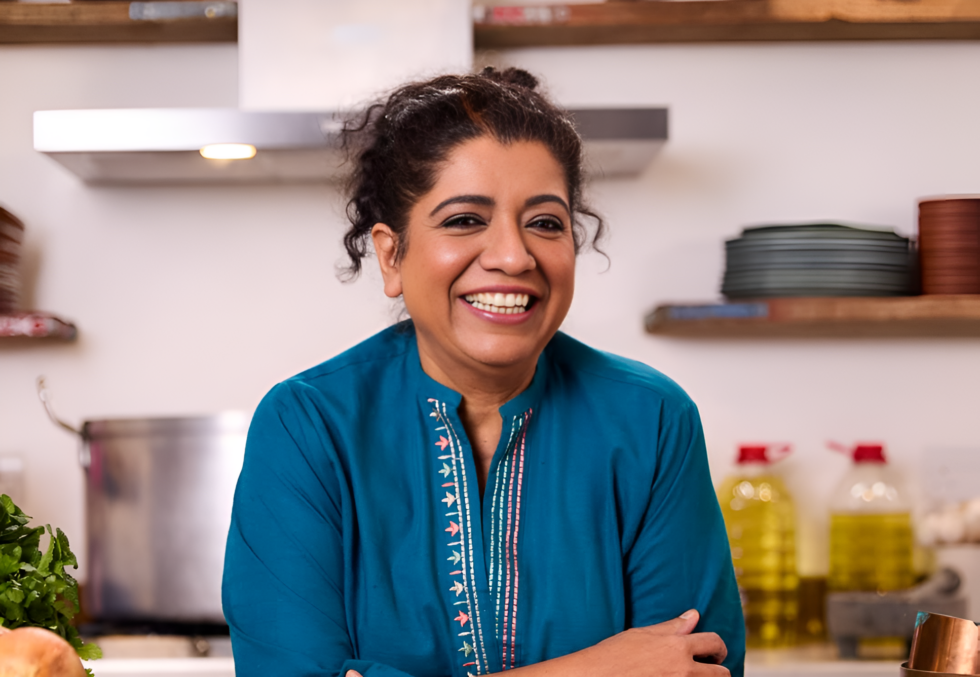
Introduction
In a bustling corner of London’s Covent Garden, a restaurant named Darjeeling Express hums with the sounds of spices sizzling, laughter, and clinking cutlery. But what makes this place truly special is not just the food—it’s the story behind it. At the helm is Asma Khan, an Indian-born British chef, restaurateur, author, and activist, whose rise in the culinary world has redefined more than just taste—it’s redefined power, representation, and purpose in kitchens.
From Netflix stardom to a spot on the UN World Food Programme, Khan has become a symbol of resilience, female empowerment, and cultural pride. Her journey from Calcutta to London’s elite culinary scene is not only inspiring—it’s groundbreaking.
Early Life and Background
Born in Calcutta (now Kolkata), India, Asma Khan grew up in a traditional royal Muslim family. As the second daughter, her birth was considered less than ideal in a patriarchal society that favored sons a sentiment that deeply impacted her identity. But rather than allow it to limit her, Khan transformed this early rejection into a lifelong mission: to uplift the voices and presence of women who are often overlooked.
In 1991, she moved to the UK after marrying a law student. The cultural transition was intense, and to cope with the homesickness, she began cooking traditional dishes from her homeland. What started as a therapeutic venture quickly grew into a passion and ultimately, a profession.
Academic Life to Culinary Success
Interestingly, Khan did not begin her career in food. She pursued a PhD in British Constitutional Law at King’s College London. However, her kitchen slowly began to outshine the lecture halls. As her cooking gained popularity among friends and community members, she launched an underground supper club in her home in 2012.
The supper club, rooted in authentic Indian recipes and familial warmth, became an instant success. It was not just the flavors that drew people in—it was the story, the sincerity, and the all-women kitchen, many of whom had never worked professionally before.
Darjeeling Express: More Than a Restaurant
In 2017, Khan opened Darjeeling Express, named after the famous train route from Kolkata to Darjeeling. The restaurant reflects the diversity of India’s culinary traditions, from Bengali mustard fish to Mughlai lamb curries. But more significantly, it represents a social revolution.
Darjeeling Express employs an all-female, all-self-taught team of South Asian immigrants—many of them mothers and homemakers—who were often excluded from the professional sphere. Khan didn’t just train these women in cooking; she gave them dignity, financial independence, and a voice.
In an industry where kitchens are dominated by male chefs and toxic hierarchies, Khan’s model of community, care, and cooperation has stood as a radical alternative.
Netflix and Global Recognition
Asma Khan’s impact reached a global audience when she became the first British chef to be featured on Netflix’s “Chef’s Table” in 2019. Her episode was widely acclaimed for its emotional depth and powerful narrative around identity, womanhood, and resilience.
Khan’s authenticity struck a chord with viewers across the world. She didn’t pretend to be a traditional chef trained in Michelin-starred kitchens—she was a self-taught home cook who wore her heritage on her sleeve and used her platform to uplift others.
Since the show, Khan has been invited to speak at global forums, including TED Talks, the United Nations, and academic institutions, advocating for food justice, gender equality, and migrant rights.
Books, Advocacy, and Honors
In 2018, she released her debut cookbook, “Asma’s Indian Kitchen,” a celebration of home-cooked meals passed down through generations. The book was named “Best Cookbook of the Year” by The Sunday Times and was praised for its heartfelt stories and accessible recipes.
In 2022, Khan was appointed as a Chef Advocate for the United Nations World Food Programme, further cementing her role as a humanitarian voice in the food industry. She was also honored as an Honorary Fellow at King’s College London, recognizing her contributions to both education and social change.
Khan is also a vocal advocate for sustainability in food systems and the preservation of traditional culinary knowledge in the face of globalization.
A Feminist Kitchen
At the heart of everything Khan does is a deep feminist ethos. Her kitchen is a space of healing, solidarity, and empowerment. She has often spoken about the silence and invisibility of women in kitchens especially the immigrant women whose labor fuels households and economies but is rarely acknowledged.
“We cook with our hearts. Every dish tells a story,” Khan once said in an interview. Her leadership style is collaborative rather than authoritarian, challenging the aggressive culture of most professional kitchens.
Future Plans and Legacy
Looking ahead, Khan plans to expand the Darjeeling Express model globally not as a franchise but as a movement. She envisions community kitchens led by women, where food becomes a medium of storytelling, cultural preservation, and empowerment.
Khan’s journey is far from over, but her legacy is already profound. In a world hungry for authenticity, representation, and justice, she offers a model of leadership that is deeply rooted in compassion and courage.
Conclusion
Asma Khan is not just a chef—she is a changemaker. Through Darjeeling Express, her books, and her global advocacy, she has transformed the kitchen from a space of labor to one of liberation. Her story is a reminder that true leadership isn’t about dominance—it’s about lifting others as you rise.


